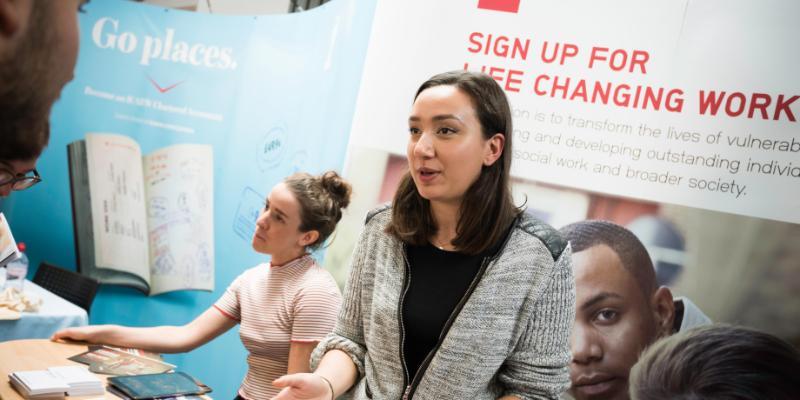
Explore your options
Find out what researchers do, and how much they earn after completing their PhD, in this summary report of destination data (2022) from Vitae (log in/register with your University email address for free access).
Enrol on the Career Management for Early Career Academic Researchers MOOC on Futurelearn. This free course is available from October to June.
Visit the sections below to explore resources on: academic careers; academic-adjacent careers, and careers in other sectors.
An academic career
Many research students start a PhD with the aim of entering an academic career, but competition for opportunities is intense and gaining permanent contracts can be difficult. Make sure that you understand the realities of an academic career and make a realistic assessment of your motivation and commitment. Talk to your supervisor, academic and research staff, and use the following resources:
- Pursuing an academic career (Vitae)
- Jobs.ac.uk have advice on building academic and research careers and have produced a series of e-books on topics such as ‘The essential guide to moving up the academic career ladder’
- Research fellowships at York, and link to more fellowship schemes
- List of fellowship opportunities for early career researchers (internal use only - University of York email required)
- Times Higher Education Skills for early career academics and other articles in their Spotlight series
- What do Postdocs do next? University of Cambridge Careers Service
- If you're asked to submit a teaching portfolio, these resources may be helpful:
- Academic applications (University of Oxford)
- Academic applications and interviews (University of Cambridge).
-600x600.JPG)
Professional careers in higher education

PhD graduates are found in a range of careers in higher education, not just teaching and research. Some are ‘research-adjacent’ (related to, or supporting research), some are ‘Prac-ademic’ (a practitioner with an academic slant) and others are in ‘professional services’ (a range of administrative and student support roles). Roles also exist in organisations who support research or researchers (eg Research Councils, learned societies), in business development and several other areas.
- The PhD Careers blog: Academic adjacent careers - what are they?
- Research Adjacent website and podcast
- Case study: Dr Daniel South, Senior Strategic Engagement and Policy Manager, University of East London (PhD English and Related Literature, University of York)
Careers in other sectors
More than half of UK PhD graduates enter non-academic careers so pursuing a career outside academia shouldn’t be seen as an alternative or less prestigious option; for many, it is an active choice.
As a research graduate you develop a range of skills that are highly valued by employers in a wide variety of sectors. Even if a job doesn’t require a PhD, employers often say that researchers add value to the role and progress quickly.
Arts and Humanities PGRs at York will find it helpful to look at the Beyond Academia resource.
Explore the following resources to see what researchers have gone on to do, and to gain inspiration:

- Vitae: Researcher Career Stories
- UKRI: 101 Jobs that change the world
- University of Glasgow Pathfinder Career Narratives
- The British Academy: Career pathways of doctoral graduates in the arts, humanities and social sciences
- Opportunities in Science - podcast from Dr Mhairi Towler
- Career planning strategies for Scientists podcast series from Nature Careers - a series of 6 podcasts focused on creative approaches to career planning through conversations with career guidance professionals and researchers
- Career profiles (Research Careers)
- Birmingham University’s PGR Career Explorer resource
- Explore non-lab based options for scientific researchers
- Jobs.ac.uk have advice on working in industry and professional roles
- Case studies for work in Policy including Claire Baker, Policy and Research Consultant (PhD SPSW, University of York)
Business start-up, freelancing and enterprise
The University offers support to students and recent graduates to develop their business ideas and build skills and confidence to start them. Support includes skills training, individual advice and funding to apply for. Enterprise at York has more information - note, not all schemes are appropriate for postgraduates.
Information on freelancing and creative freelancing.
Transferable skills
Outside higher education your skills and experiences can be transferred to a range of career options. Find out how you can relate your research skills to the skills typically required by employers:
- The Vitae Researcher Development Framework articulates the knowledge, skills and behaviours of researchers and is used for planning and supporting professional development.
- Top 20 transferable skills every PhD can use to get hired from the Cheeky Scientist
- Transferable skills from your PhD from Jobs.ac.uk
- Skills Tree - a resource for researchers in the Arts and Humanities at York

Which career might suit you?
If you are finding it difficult to think of types of work that might suit you, or you aren't sure of what your options are, here are some resources to help you to generate ideas. Start with our tools for Exploring your options to help you to start reflecting on your skills, strengths, personality, motivations and values. When you research jobs, think about the typical tasks and work environment and whether these would suit your work preferences and skills.
These tools can help you to generate ideas as a starting point:
- What job would suit me? (Prospects)
- Imagine PhD (generate career ideas for humanities and social science researchers)
- My IDP Science Careers (generate career ideas for science researchers)
- Prosper: Career Development Navigator - aimed at Postdocs but useful for PGRs too
If you're finding it difficult to identify careers that might suit you, try these tools to generate ideas as a starting point:
- What job would suit me? (Prospects)
- Imagine PhD (generate career ideas for humanities and social science researchers)
- My IDP Science Careers (generate career ideas for science researchers).
Explore job sectors and meet employers
Attend recruitment fairs and employer presentations and webinars to meet employers, find out more about their opportunities and discuss your skills and experiences with them.

Video recordings
Explore our PhD playlist on YouTube, which includes:
- Case study: Taryn
- PhD graduate Taryn talks briefly about changing career plans after realising being an academic was not for her.
- Career support for Postgraduate Researchers
- Information about careers support and information resources available to postgraduate researchers at the University of York
- Careers support for online and distance learners
- Find out how Careers and Placements offers information and support to students studying online and distance programmes.
Online resources
- Job sectors
- Job sectors (Prospects)
Recruitment fairs
Attend recruitment fairs Careers and Placements organise recruitment fairs in autumn (which include a range of sectors including law, public sector, technology, engineering, business and finance). Whilst many of their opportunities will not specifically require a PhD, you are still eligible to apply. Some employers sponsor you to obtain relevant professional qualifications, such as in law, accountancy, and patent attorney.
Specific sector events
Each year we run some events which are designed to offer an insight into specific sectors and types of work. In the past these have included sectors such as Environment, Research, Arts and Heritage, Not for Profit and Policy. Many of the speakers who attend are York alumni and some have a research degree.
Employer events
Webinars and skills workshops offer a more in-depth opportunity to find out about jobs and network with employers. Employers targeting York students have included law firms, professional services firms (consultancy, tax, accountancy), technology companies, Civil Service, McKinsey, NHS, Morgan Stanley and Accenture. Some employers will arrange presentations in academic departments – look out for information from your department.
Alumni events
Alumni events run by your academic department offer a chance to hear from alumni and talk informally with them.
Other events and conferences
Other career events and conferences run by your department, research councils, professional bodies and learned societies – these can offer great networking opportunities. Make sure you are a member of relevant professional bodies to gain access to external conferences and networking events.
Events organised by Careers and Placements and other external careers events are advertised on Handshake.
Get advice from Careers and Placements
Careers and Placements offer careers advice appointments specifically for postgraduate research students These can be use for careers advice and application/interview support. Find out about these and the other appointments available to you. Appointments can be booked online via Handshake.

